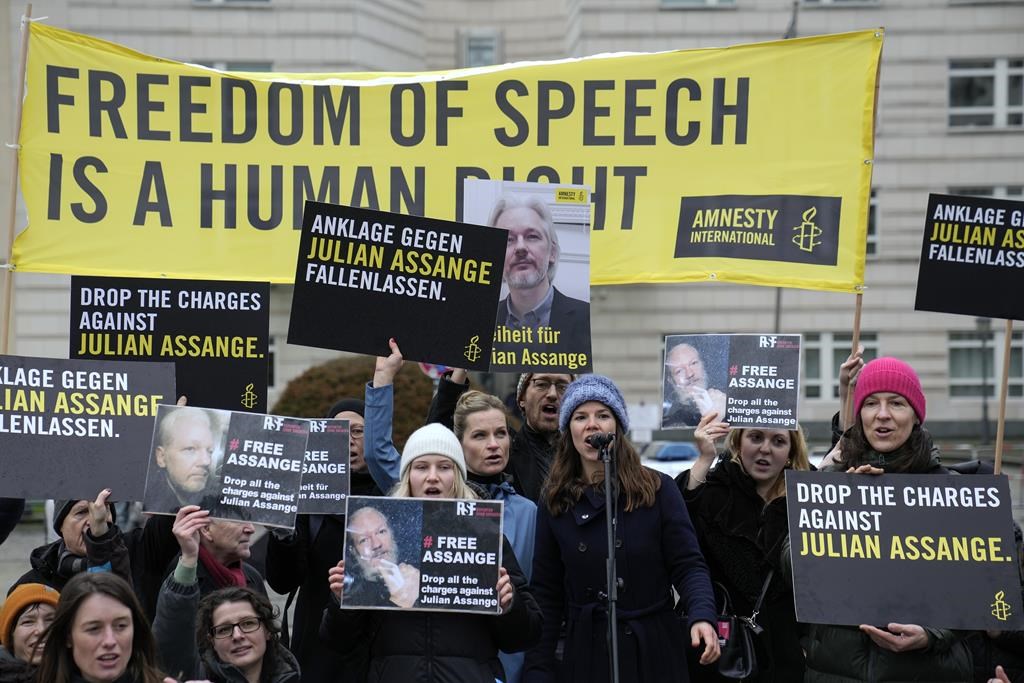Timeline of the Assange legal saga as he makes a final bid to avoid extradition to the US

LONDON (AP) — WikiLeaks founder Julian Assange has been fighting for more than a decade to avoid extradition to the United States to face charges related to his organization’s publication of a huge trove of classified documents. He has been in custody in a high-security London prison since 2019, and previously spent seven years in self-exile in the Ecuadorian Embassy in London.
As his lawyers begin a final round of legal challenge Tuesday to stop him from being sent from Britain to the U.S., here is a look at key events in the long-running legal saga:
— 2006: Assange founds WikiLeaks in Australia. The group begins publishing sensitive or classified documents.
Advertisement
— 2010: In a series of posts, WikiLeaks released almost half a million documents relating to the U.S. wars in Iraq and Afghanistan.
— August 2010: Swedish prosecutors issue an arrest warrant for Assange based on one woman’s allegation of rape and another’s allegation of molestation. The warrant is withdrawn shortly afterward, with prosecutors citing insufficient evidence for the rape allegation. Assange denies the allegations.
— September 2010: Sweden’s director of prosecutions reopens the rape investigation. Assange leaves Sweden for Britain.
— November 2010: Swedish police issue an international arrest warrant for Assange.
— December 2010: Assange surrenders to police in London and is detained pending an extradition hearing. High Court grants Assange bail.
Advertisement
— February 2011: District court in Britain rules Assange should be extradited to Sweden.
— June 2012: Assange enters Ecuadorian Embassy in central London, seeking asylum on June 19, after his bids to appeal the extradition ruling failed. Police set up round-the-clock guard to arrest him if he steps outside.
— August 2012: Assange is granted political asylum by Ecuador.
— July 2014: Assange loses his bid to have an arrest warrant issued in Sweden against him canceled. A judge in Stockholm upholds the warrant alleging sexual offences against two women.
— March 2015: Swedish prosecutors ask to question Assange at the Ecuadorian embassy.
Advertisement
— August 2015: Swedish prosecutors drop investigations into some allegations against Assange because of the statute of limitations; an investigation into a rape allegation remains active.
— October 2015: Metropolitan Police end their 24-hour guard outside the Ecuadorian embassy but say they’ll arrest Assange if he leaves, ending a three-year police operation estimated to have cost millions.
— February 2016: Assange claims “total vindication” as the U.N. Working Group on Arbitrary Detention finds that he has been unlawfully detained and recommends he be immediately freed and given compensation. Britain calls the finding “frankly ridiculous.”
— September 2018: Ecuador’s president says his country and Britain are working on a legal solution to allow Assange to leave the embassy.
— October 2018: Assange seeks a court injunction pressing Ecuador to provide him basic rights he said the country agreed to when it first granted him asylum.
Advertisement
— November 2018: A U.S. court filing that appears to inadvertently reveal the existence of a sealed criminal case against Assange is discovered by a researcher. No details are confirmed.
— April 2019: Ecuadorian President Lenin Moreno blames WikiLeaks for recent corruption allegations; Ecuador’s government withdraws Assange’s asylum status. London police arrest Assange at the Ecuadorian embassy for breaching bail conditions in 2012, as well as on behalf of U.S. authorities.
— May 2019: Assange is sentenced to 50 weeks in prison for jumping bail in 2012.
— May 2019: The U.S. government indicts Assange on 18 charges over WikiLeaks’ publication of classified documents. Prosecutors say he conspired with U.S. army intelligence analyst Chelsea Manning to hack into a Pentagon computer and release secret diplomatic cables and military files on the wars in Iraq and Afghanistan.
— November 2019: Swedish prosecutor drops rape investigation.
Advertisement
— May 2020: An extradition hearing for Assange is delayed amid the COVID-19 pandemic.
— June 2020: The U.S. files new indictment against Assange that prosecutors say underscores Assange’s efforts to procure and release classified information.
— January 2021: A British judge rules Assange cannot be extradited to the U.S. because he is likely to kill himself if held under harsh U.S. prison conditions.
— July 2021: The High Court grants the U.S. government permission to appeal the lower court’s ruling blocking Assange’s extradition.
— December 2021: The High Court rules that U.S. assurances about Assange’s detention are enough to guarantee he would be treated humanely.
Advertisement
— March 2022: Britain’s top court refuses to grant Assange permission to appeal against his extradition.
— June 2022: Britain’s government orders the extradition of Assange to the United States. Assange appeals.
— Feb. 20, 2024: Assange’s lawyers launch a final legal bid to stop his extradition at the High Court.
Sylvia Hui, The Associated Press
Advertisement